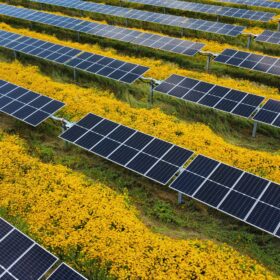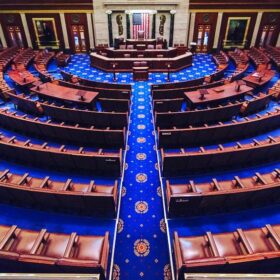Clean energy advocates, including some of the state’s prominent solar-installation firms, gathered on the Maryland statehouse steps on Thursday to encourage the legislature to override Republican Gov. Larry Hogan’s veto of the Clean Energy Jobs Act of 2016.
The override would clear the way for Maryland to continue advancing its energy infrastructure, job growth and savings. It would increase the state’s renewable portfolio standard (RPS) 5% (from 20 to 25%) and a one-half of 1% rise in the solar carve-out portion of the bill (which would rise to 2.5% from its current level of 2%).
After passing with overwhelming majorities in both houses of the state legislature, most observers believed the law was a done deal – but in a move that surprised almost everyone, Hogan vetoed the bill, calling it a tax increase that would be excessively burdensome to all ratepayers.
Though the legislature is firmly in the hands of state Democrats, no one is taking an override for granted – least of all the two sponsors of the bill: State Senator Brian Feldman and House Delegate C. William Frick.
The two men led Thursday’s rally and spoke harshly of Hogan’s opposition, tying it to President-elect Donald J. Trump’s Climate Change denial and anti-renewable Cabinet appointments.
But Tony Clifford, chief development officer for Rockville, Md., based Standard Solar, warned against turning the override into a purely partisan endeavor.
“While I welcome the expansion of the RPS that a veto override would create, continued growth of the Maryland solar industry will also require a more fundamental look at solar’s legislative framework,” said Clifford, whose President and CEO Scott Wiater started lobbying for the override in mid-December.
With the solar industry’s demonstrated ability to add energy infrastructure and create good jobs, I hope this can be accomplished in a bipartisan manner,” he added.
According to Clifford, the solar industry has made a significant contribution to the energy infrastructure of Maryland in the past several years. Indeed, with nearly 700 MW of solar installed, the industry has added the equivalent of more than two natural gas peaker plants.
This content is protected by copyright and may not be reused. If you want to cooperate with us and would like to reuse some of our content, please contact: editors@pv-magazine.com.








By submitting this form you agree to pv magazine using your data for the purposes of publishing your comment.
Your personal data will only be disclosed or otherwise transmitted to third parties for the purposes of spam filtering or if this is necessary for technical maintenance of the website. Any other transfer to third parties will not take place unless this is justified on the basis of applicable data protection regulations or if pv magazine is legally obliged to do so.
You may revoke this consent at any time with effect for the future, in which case your personal data will be deleted immediately. Otherwise, your data will be deleted if pv magazine has processed your request or the purpose of data storage is fulfilled.
Further information on data privacy can be found in our Data Protection Policy.